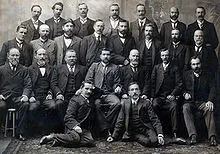Western Australia is more than just a region; it’s a tapestry of diverse communities, dreams, and aspirations. As the Australian Christians Party, we recognise the importance of every voice, every belief, and every ideology that forms the foundation of our democratic ethos.
With the next elections beckoning, it’s not merely about casting a vote; it’s about making a choice for the future, a choice grounded in understanding and knowledge.
Thus, we’ve endeavoured to craft this overview, aiming to shed light on the political parties that play pivotal roles in shaping the destiny of Western Australia.
In the spirit of transparency, cooperation, and collective progress, we present this guide, hoping to equip the citizens of Western Australia with the insights they need to make an informed decision for our shared future.
Australian Christians Party: Advocates of Faith, Family, and Integrity in Politics
In contemplating the trajectory of Australia’s future, one cannot underestimate the influence of foundational values and principles.
Many Australians ponder upon the legacy they will leave for their progeny and the nation at large.

The Australian Christians party stands at the forefront of this contemplation, aiming to be the beacon for families longing for a better Australia.
Established in 2011, the Australian Christians emerged to champion the cause of faith, familial values, and liberty in the Australian political arena.
Australian Christians commitment is not merely to be a voice in the Parliament but to be one that reverberates with Christian principles, ensuring accountability, integrity, and breaking through the cacophony of typical political rhetoric.
Their foundational tenets are:
- Parliamentary Revelation: Aspire to reflect God’s glory and righteousness within both Federal and State Government institutions, building upon Australia’s description in 1901 as “A Christian Commonwealth”.
- Divine Legislation: Endeavour to align all legislative procedures with God’s will, as epitomised in the Holy Bible, placing an emphasis on the ministry of reconciliation (2 Corinthians 5:18).
- Electing Christian Leaders: Actively endorse and promote Christian candidates, particularly targeting the upper houses of Parliament and Legislative Assemblies.
- Constitutional and Sovereign Respect: Pledge allegiance to Australia’s Christian-based constitutional monarchy and the Westminster system of governance, with policies reflecting Australia’s sovereignty.
- Upholding Christian Heritage: Advocate for policies that resonate with the Judeo-Christian ethos, encompassing pro-marriage, pro-family, pro-child, pro-moral, pro-life, and pro-Australian stances.
Bearing the banner of Christianity, they are motivated by biblical scriptures that instruct them to be a beacon of righteousness, such as Jeremiah 51:27, Matthew 5:16, Isaiah 62:6, and Romans 13:3.
The essence of these scriptures is beautifully encapsulated in their mission to illuminate the nation with Christian principles and be guardians of good governance.
Quick Facts:
- President: Mike Crichton
- Founded: 2011
- Headquarters: 16 Guthrie Street, Osborne Park, Western Australia, 6017
- Ideological Spectrum: Conservatism, Social conservatism, Christian right
- Political Stance: Right-wing
- Faith: Christianity
As the landscape of Australian politics continually evolves, the Australian Christians remain steadfast, reiterating the eternal values of faith, integrity, and family for the nation’s betterment.
Animal Justice Party The Rise of Animal Advocacy
In 2009, amidst mounting public dismay over the mistreatment of non-human creatures across Australia, the Animal Justice Party (AJP) emerged as a beacon of hope for animal rights activists and sympathisers.

Underlying Principles
At the heart of AJP’s ethos is the intent to bestow animals with a political voice, navigating the intricate channels of Australia’s political landscape to foreground animal protection issues. Their mission is not merely to champion the cause themselves but to influence and persuade other political factions to embrace animal-centred policies.
Engagements and Endeavours
The AJP is unyielding in its quest to bolster animal protection legislations. By pressing for harsher sanctions against those found guilty of animal cruelty, and advocating for stringent regulations governing the trade of domestic pets, the party continuously refines its approach. Additionally, they fervently promote both educational and public awareness campaigns concerning the ethical treatment of animals.
Vision for the Future
The AJP envisions a societal transformation: a community that embodies the virtues of respect, compassion, and kindness towards animals. Their dream is of a realm where every animal, irrespective of species, thrives in its natural milieu, and where their unique needs are both acknowledged and safeguarded.
Strategic Pathway
Their roadmap to instigate change is multifaceted:
- Educational Evolution: Advocacy for a pedagogical framework emphasising the sanctity of the natural world and our custodial duties towards its inhabitants.
- Political Inclusivity: A democratic system where every citizen’s voice concerning animal rights is heard and valued.
- Transparent Governance: An administrative regime where dealings in environmental and animal affairs are both open and ethical.
- Ethical Economics: A recalibration of economic metrics, prioritising ethical considerations and the intrinsic value of nature.
- Societal Ethos: The promotion of a collective belief that humans bear the responsibility for the welfare of all creatures.
- Juridical Enhancement: Lobbying for a legal structure that recognises and upholds the rights of all beings – humans, animals, and the environment.
- Sustainable Habitats: A call for settlement patterns and land utilisation that genuinely benefit all residents and ecosystems.
In sum, the Animal Justice Party’s approach to animal rights is both holistic and pioneering. It transcends mere advocacy, aiming for systemic transformations in education, legislation, economic values, and societal norms.
This ambitious strategy signifies a profound acknowledgment of the intertwined destinies of human welfare, animal rights, and environmental conservation.
The Legalise Cannabis WA Party: A Drive for Reform
In Australia, the clamour for Cannabis legislation reform is notably vibrant, often regarded by the masses as an issue that should reside within the federal domain.
The noteworthy petition presented to the Federal Government in 2018, rallying for a plebiscite during the 2019 Federal Election on the legalisation of Cannabis, accrued an impressive 13,000 signatures in a mere month.

Greg Hunt, the Federal Health Minister, responded with clarity:
The present government (LNP) is averse to sanctioning Cannabis for recreational use. However, it’s pertinent to note that matters encompassing prohibition, deregulation, and decriminalisation predominantly fall under state and territory jurisdictions.
Such a stance unequivocally underscored the necessity to champion this cause at the state echelon. In Western Australia, the substantial financial outlay dedicated to an ostensibly unproductive drug policy is a growing concern.
This sentiment is echoed in the Illicit Drug Data Report of 2016/17, illustrating that a staggering 92% of Cannabis arrests nationwide were consumers.
From this figure, Western Australian consumers constituted 26.4%. Data from the Australian Bureau of Statistics (ABS) from 2017 further corroborates the gravity of the situation, revealing that illicit drug offences dominated the list of principal offences.
Origins of the Legalise Cannabis WA Party
Drawing inspiration from the successes of its counterpart in Queensland during their October 2020 elections, the Legalise Cannabis WA Party was conceived. The Queensland branch, Legalise Cannabis Qld (LCQ), was the precursor to what is envisioned as a cohesive national network advocating for the legalisation of Cannabis in its entirety.
Following Queensland, Western Australia was next, with New South Wales and Victoria anticipated to join the movement soon.
However, LCWA is pragmatic in its goals. Winning the government might be far-fetched, but clinching a seat in the cross-bench would be monumental.
Such a seat would be a voice for Western Australians who savour cannabis recreationally, require it medicinally, or advocate for hemp’s agricultural potential.
The upcoming elections are an opportune moment to amplify this cause.
The Grape Theory:
At the heart of LCWA’s approach is the simplistic yet impactful ‘Grape Theory’. Envisaging Cannabis akin to grapes, the belief is that growing and consuming grapes (akin to Cannabis) should be unrestricted.
However, commercial ventures should mandate licensing, ensuring product quality and consumer safety.
With tangible choices on the horizon in Western Australia, it is crucial for the public to ensure their electoral enrolments and details are current.
The Liberal Party
Tracing its roots back to 12th January 1945, the Western Australian Division of the Liberal Party was founded in the wake of the influential Albury Conference.
This event unified various factions opposing socialist political ideologies, culminating in the birth of the Liberal Party of Australia.

Briefly diving into history the Nationalists, the forerunners of the Liberals, had been relegated to the opposition since 1933.
However, the nascent Liberal Party soon garnered escalating support. A watershed moment occurred in October 1945 when WWII veteran and shopkeeper, David Brand, clinched the Greenough seat in a by-election, marking the first victory over the ALP.
Under the leadership of Ross McLarty, the party triumphed in the 1947 State elections, ending Labor’s 14-year reign and steering WA towards industrial progression. Throughout its history, the Liberal Party saw many visionaries like David Brand and Charles Court, who significantly impacted Western Australia’s socio-economic and political landscapes.
Fast-forwarding, after a spell in the opposition, the party, under the stewardship of Colin Barnett, wrested back control, confronting the arduous task of rectifying the preceding government’s inertia.
This mandate led the Liberals to embark on an ambitious capital programme, revamping Western Australia’s infrastructure while expanding public services to meet the needs of a burgeoning population.
Core Beliefs of the Western Australian Liberal Party
- Belief in Australia’s potential and its citizens.
- Upholding individual rights, freedoms, and recognising the inherent worth of each person.
- Championing equal opportunities in a united nation.
- Advocating for a society that takes care of its vulnerable, ensuring they live with dignity.
- Recognising the family as a cornerstone for societal values.
- Promoting wealth creation, competitive enterprise, and rewarding diligence.
- Adhering to the principle of mutual obligation, linking government benefits with community contributions.
- Valuing voluntary initiatives and organisations.
- Supporting parliamentary democracy as the prime platform for a free society’s aspirations.
- Advocating for a decentralised power system, wherein local issues are decided at grassroots levels.
- Recognising the importance of a symbolic head of state.
- Asserting that the government should focus on its core responsibilities without vying with the private sector.
- Upholding the law’s sanctity, ensuring justice, and granting equal rights to every citizen.
- Endeavouring to play a constructive role on the global stage, promoting peace, and aiding less advantaged nations.
- Embracing Liberalism as the quintessential philosophy to address the challenges and demands of the 21st century.
The Greens Party (WA)
Hailing from Western Australia, The Greens (WA) holds its roots with the Australian Greens and stands tall amidst a myriad of Green political parties on a global scale.
While it’s a common misperception to label Green parties as singular in their focus, The Greens (WA) begs to differ.
The party’s forward-looking vision is firmly anchored in the four tenets of social justice, ecological sustainability, peace coupled with nonviolence, and grassroots democracy.

This breadth of vision serves as a challenge to the limited economic paradigms of dominant political entities.
Tracing back the chronicles of The Greens (WA), its establishment in 1990 emerged from the unification of the WA Green Party and the Green Earth Alliance. The Alliance itself was an amalgamation of the Alternative Coalition, the Vallentine Peace Group, and Green Development. Drawing inspiration from community movements both within WA and across Australia, as well as from the West German Greens of that era, they’ve charted a unique path.
Although there was collaboration with the Australian Greens since inception, it wasn’t until 2003 that The Greens (WA) formally embedded themselves into the Australian Greens fold. A decisive 80% membership ballot cemented this affiliation on 11th October 2003 at the Australian Greens National Conference.
Boasting a burgeoning membership, The Greens (WA) continues its relentless pursuit to ingrain its core pillars at all echelons of government. A notable milestone was Jo Vallentine’s Senate election in 1984 under the Nuclear Disarmament Party banner. Post the 1990 formation of The Greens (WA), she made history by being re-elected as Australia’s maiden Greens Senator. Senators Christabel Chamarette and Dee Margetts soon followed suit.
A significant victory for the Greens in WA occurred in 2009 when Adele Carles clinched the Fremantle Legislative Assembly seat during a by-election, making WA the second state after New South Wales where the Greens secured a lower house seat. Ten parliamentarians from The Greens (WA) have graced WA’s State parliament, a number only surpassed by Tasmania and New South Wales.
The Greens (WA) Principles:
- Social and Economic Equity: The party envisions a society rooted in justice for all, dismissing notions of excessive acquisition and greed.
- Grassroots Democracy: Championing a system that empowers every individual’s participation, thereby ensuring a genuine democratic experience.
- Peace and Disarmament: Advocating for non-aggressive, disarmament-centric conflict resolution methods.
- Ecological Sustainability: Challenging the inherent deficiencies in today’s economic and environmental systems, the party supports policies that guarantee our planet’s longevity.
Endorsing these principles, The Greens (WA) has meticulously curated policies that, if implemented, have the potential to usher in transformative changes to Australian society’s fabric.
The Labor Party
At the dawn of the 20th century, as Australia united its former colonies, the Labor party emerged on the federal stage, with roots that could be traced back to the transformative 1890s.
During this decade, individual labour parties sprouted across colonies, underpinned by the support of the trade union movement, aiming to propel politicians with aligned sympathies into the colonial parliaments.

While colonies like Western Australia, Tasmania, and Victoria lagged in forging solidified labour parties, Queensland and New South Wales witnessed the rapid ascent of potent labour entities, establishing a foothold in the parliamentary arena.
A historic moment arrived in 1899, as Queensland saw Australia’s inaugural labour government ascend to power, albeit for a fleeting seven days. While the influence of trade unions was undeniable, these burgeoning parties didn’t confine themselves to union-centric interests. Their expansive agendas wooed farmers, entrepreneurs, and non-unionised workers, spanning from clerks to other professionals.
The essence of the Labour Party was pragmatism, with a non-dogmatic approach, advocating a medley of socio-economic interests. Even though its core ethos was moderate and inclusive, it wasn’t immune to being branded as ‘extremist’ by naysayers.
1901 marked the Labour Party’s debut on the federal stage during the inaugural Commonwealth elections. The election witnessed 16 Labor stalwarts entering the House of Representatives, complemented by eight in the Senate.
Prior to Parliament’s maiden convening on 8 May 1901, these members united, giving birth to the Federal Labor Party. J.C. (Chris) Watson, a printer hailing from Sydney and an alumnus of the NSW Parliament, was chosen as the inaugural party leader.
With this, the Australian Labor Party etched its name as the nation’s most enduring political entity, its narrative deeply entwined with the annals of Australia’s democratic and labour movements.
At its core, Labor’s ethos champions workplace equity, universal access to premier education, and an unwavering belief in equal life opportunities for all.
Although the Australian Labor Party operates under a unified national banner, governed by national rules, it celebrates diversity through its distinct State and Territory branches. While they exhibit shared features, like sub-branches and administrative committees, each branch is distinct in its structure and governance.
The Western Australian Labor arm boasts organisations including:
- Labor Women’s Organisation
- Young Labor
- Country Labor WA
- First Nations Network
- Multicultural Labor Organisation
An Overview of The Nationals WA:
A Century of Representation
A Century with The Nationals WA: Serving Western Australia’s Regional Communities
The history of The Nationals WA is intrinsically woven with the evolution of Western Australia’s regional communities. This centenarian political entity, established in 1913 in the quaint Wheatbelt town of Kellerberrin by the Farmers and Settlers Association, has played a pivotal role in championing the causes of regional WA.
Initially known as the Country Party of WA, they made a swift political impact, securing seats in both the Legislative Assembly and the Legislative Council in the elections of 1914. Such a formidable entry showcased their earnest commitment to regional advocacy.
Names and titles evolved, and by 2003, they had adopted their current appellation, ‘The Nationals WA’. Yet, amid these shifts, the party’s core dedication to regional WA remained unshaken.
A defining moment in the party’s recent history was the 2008 State election. The Nationals WA, having relinquished prior coalition arrangements with the Liberal Party, emerged as a significant force, achieving a balance of power in both Houses of the State Parliament.
What followed was a pragmatic power-sharing alliance with the Liberal Party, rooted in genuine negotiations that prioritised regional interests.
Perhaps their most illustrious contribution to regional Western Australia has been the Royalties for Regions programme. Conceived during the Grylls/Barnett Government era, this programme transformed the regional economic landscape by reinvesting a segment of the state’s mining and onshore petroleum royalties.
To date, this initiative has infused funding into more than 3,600 community-centric projects across regional WA. These endeavours encapsulate The Nationals WA’s dedication to ensuring the regional heart of Western Australia thrives and prospers.
In summarising their journey, The Nationals WA stands as a testament to unwavering regional representation, steadfastly serving the diverse and dynamic communities of Western Australia for over a century.
Final Thoughts
As the sun sets over the vast expanse of Western Australia, casting shadows over its cities and wild terrains alike, a parallel story unfolds in its political horizon. The various parties, each with its distinct narrative and manifesto, present a spectrum of choices for the electorate.
But beneath the divergences lie shared aspirations – a brighter future, a prosperous land, and a harmonious society. In the intricate dance of democracy, every voice, be it a whisper or a roar, contributes to the collective symphony of progress.
Through the labyrinth of policies, ideologies, and promises, it becomes the prerogative of each citizen to discern, deliberate, and decide. The journey towards the election is not merely a choice between parties, but a reflection on the very ethos that Western Australians envision for their homeland.
As we stand on this precipice of change, may we be guided by informed perspectives, shared values, and the unwavering hope of shaping a brighter tomorrow.











